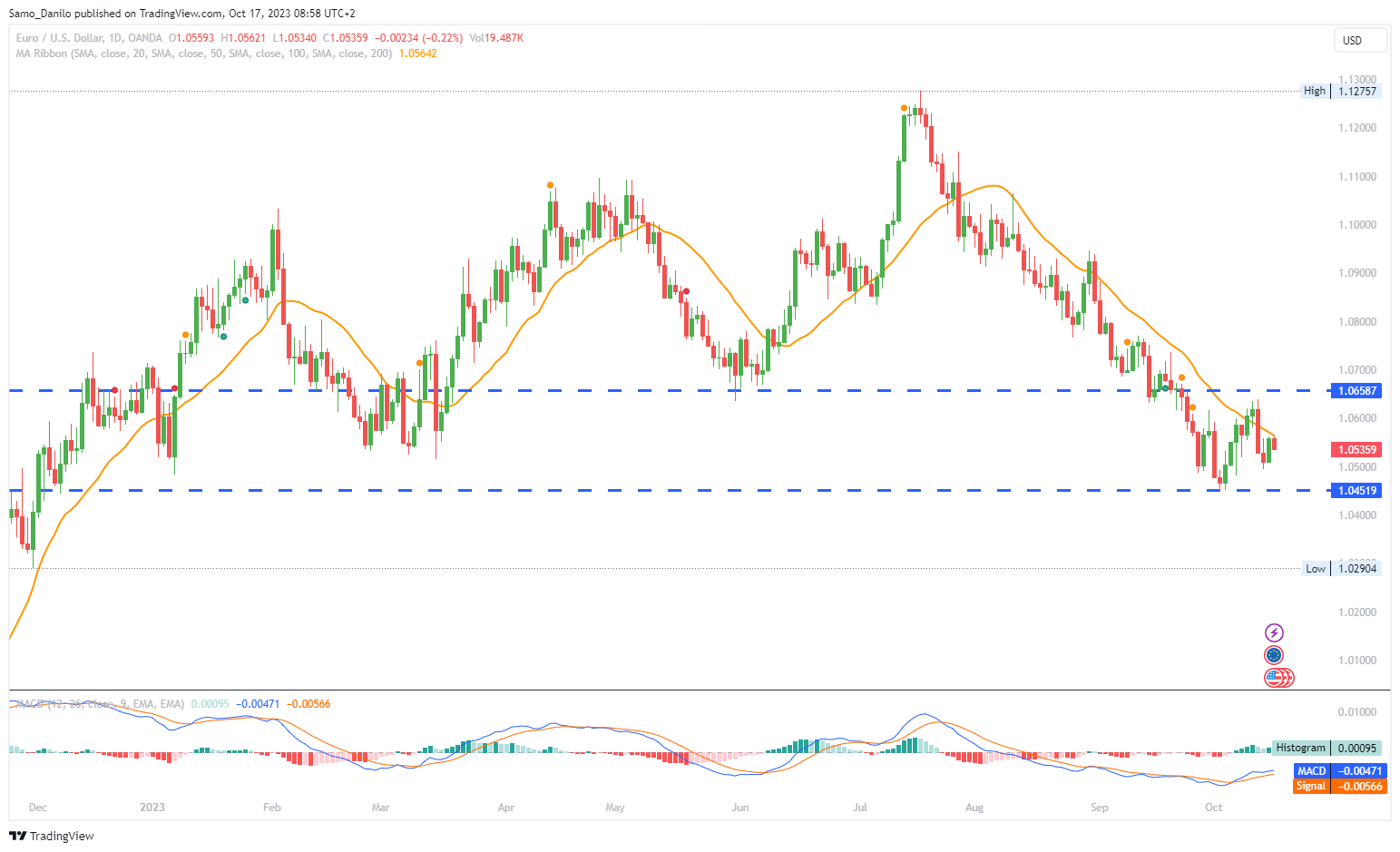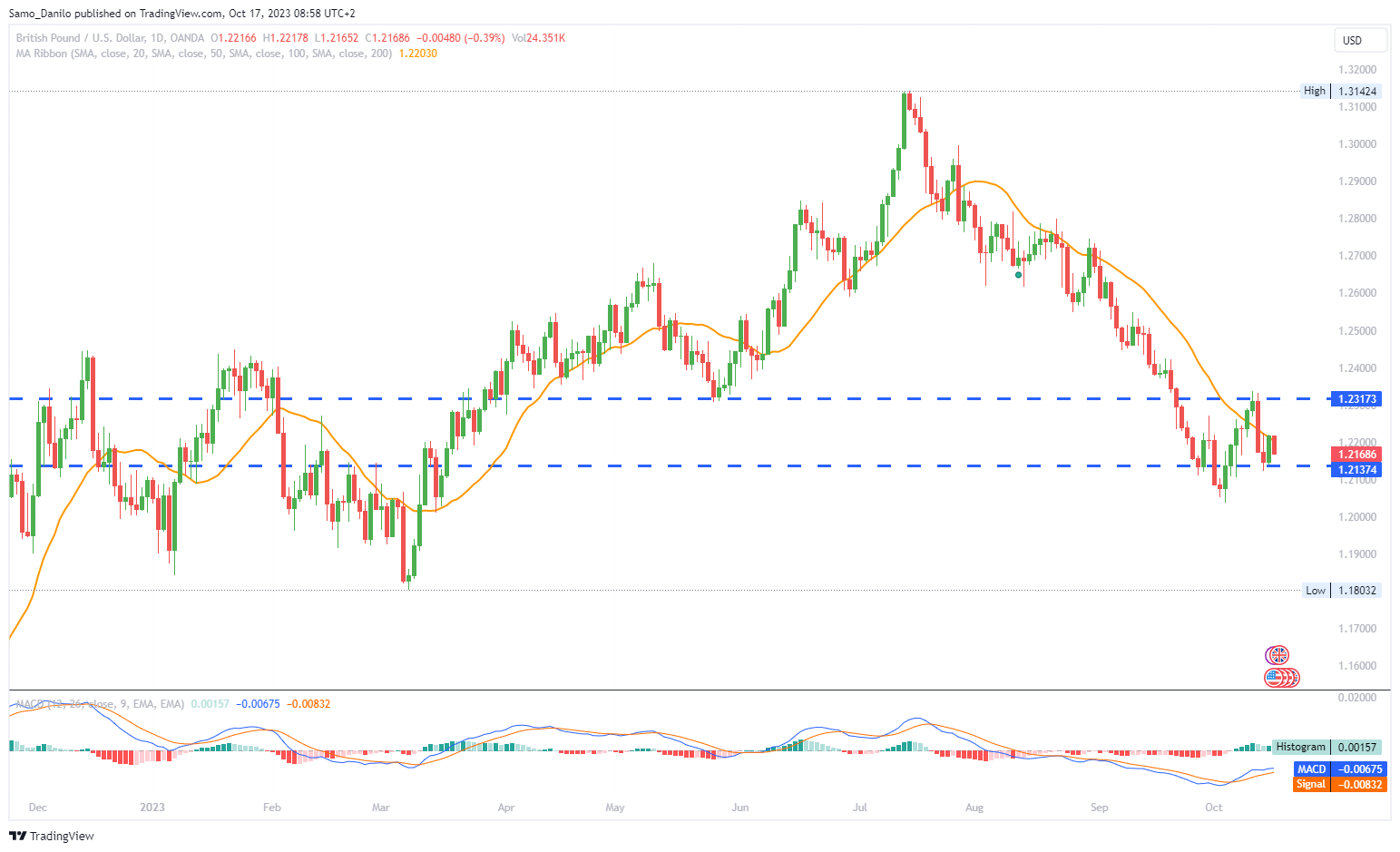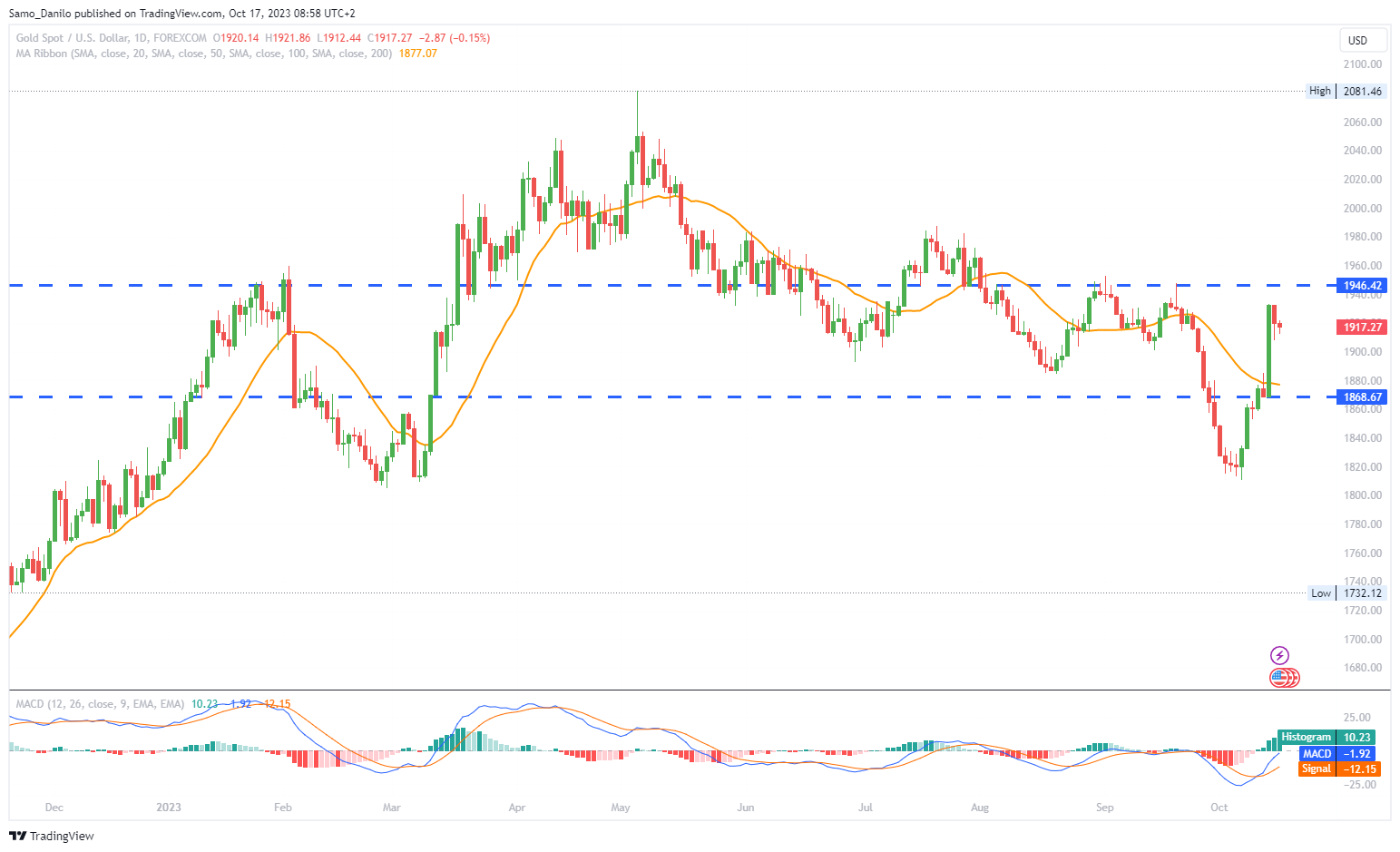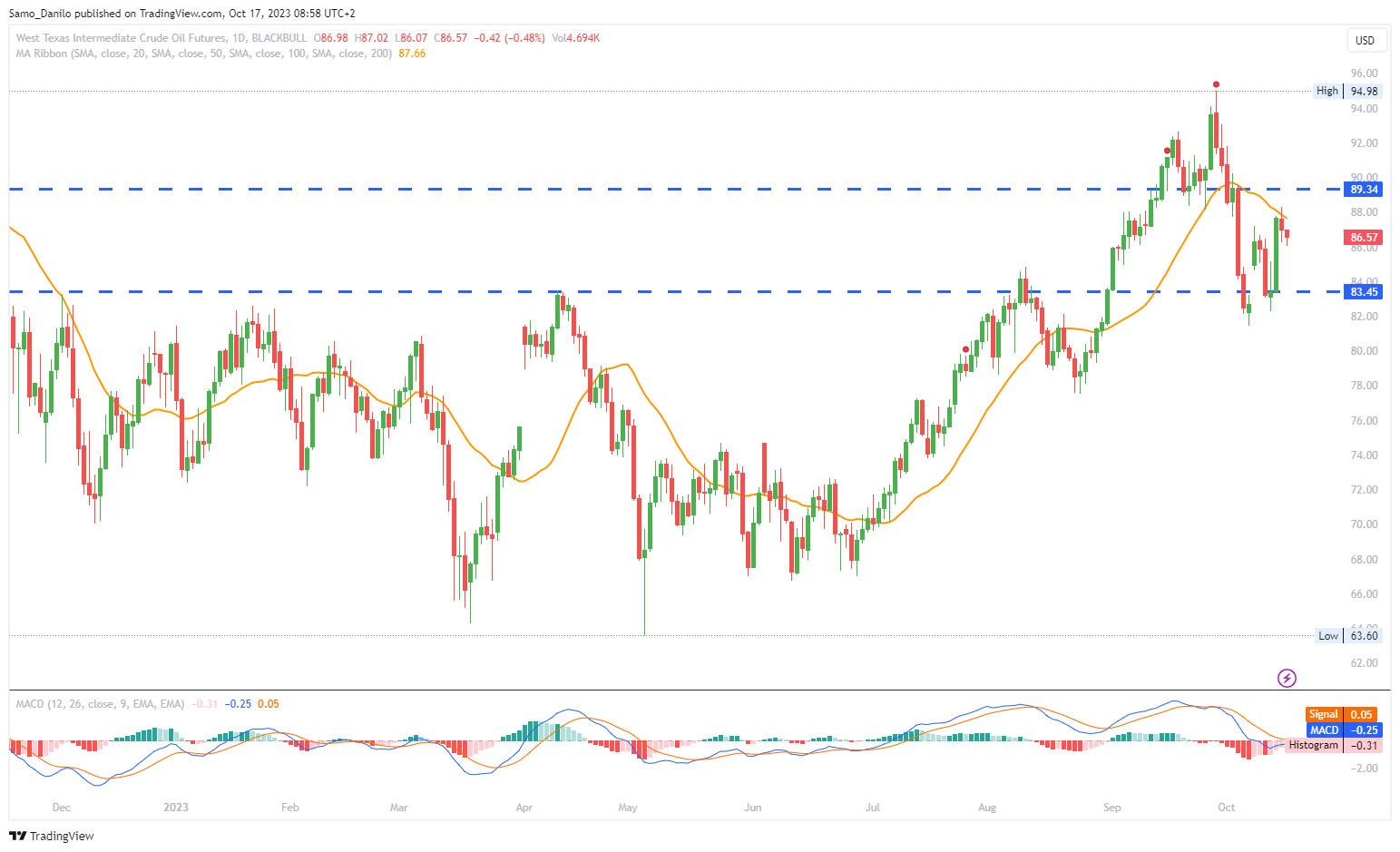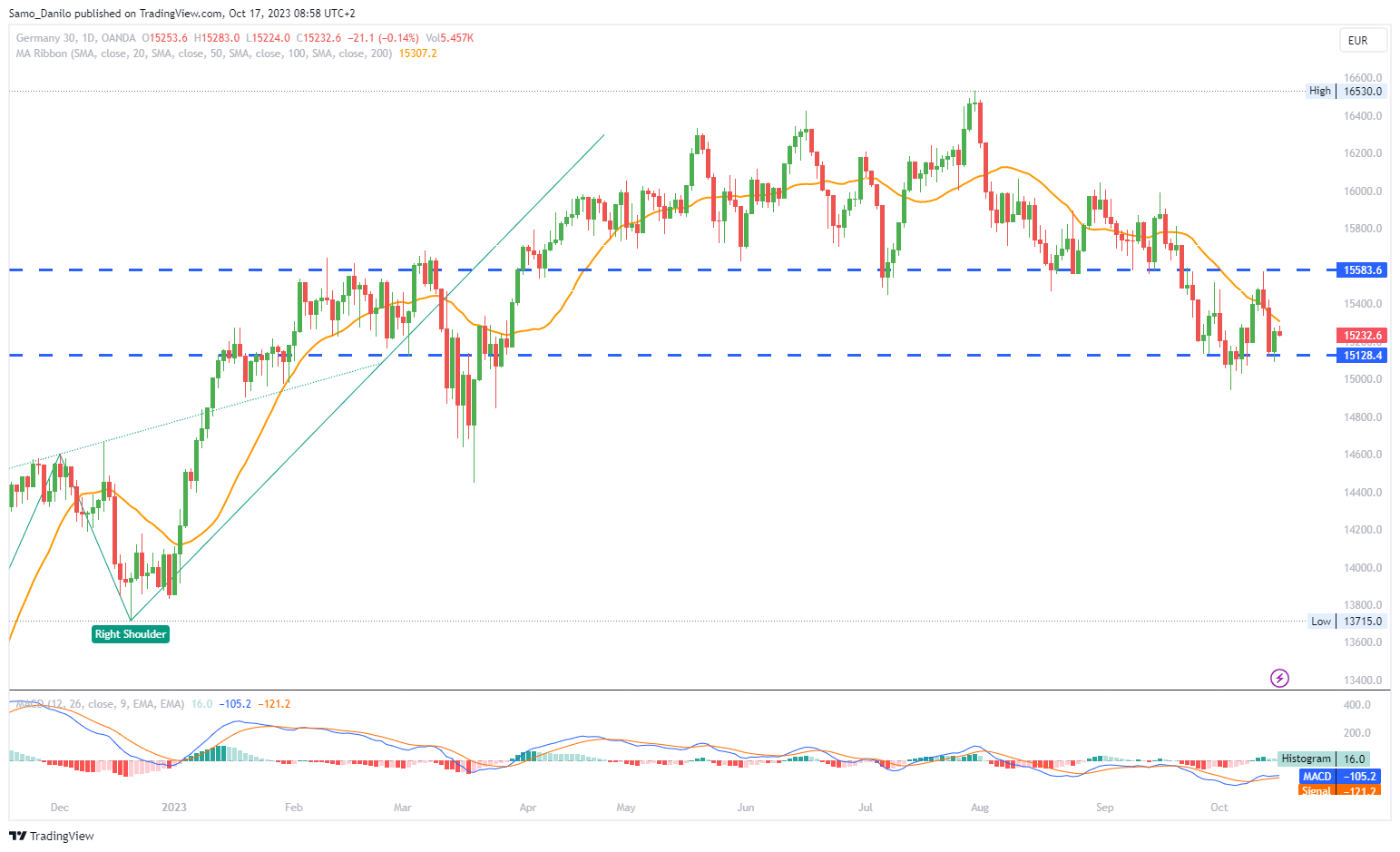EURUSD
- EUR/USD is experiencing a bearish pullback, trading near the 1.0550 psychological level during the Asian session on Tuesday, indicating a recent weakening in the Euro against the US Dollar.
- The Euro Zone reported a robust August Trade Balance with a seasonally adjusted surplus of €11.9 billion, significantly better than the previous €3.5 billion surplus. This signals improved trade conditions within the Eurozone.
- Investors are awaiting the release of the ZEW Economic Sentiment Survey for October, with expectations suggesting a potential improvement from -8.9 to -8.0. This survey could influence market sentiment.
- ECB President Christine Lagarde has alerted euro-area finance ministers about the ECB's monitoring of energy prices and the Israel-Hamas conflict as potential sources of inflation risks. This information underscores the central bank's focus on inflation factors.
- The United States published the NY Empire State Manufacturing Index, which showed a decline from 1.9 in September to -4.6 in the current month, indicating a contraction in the manufacturing sector in the New York region.
Closing statement:In summary, the EUR/USD is retreating amid a cautious market sentiment, driven by mixed economic data and concerns over potential inflationary pressures. The upcoming ZEW survey and the ECB's vigilance regarding inflation will be closely watched for further market direction.
GBPUSD
- GBP/USD is trading at lower levels around 1.2200 in early European trading, primarily driven by data from the UK indicating a modest easing of wage inflation in August.
- Wage inflation in the United Kingdom, measured by the change in Average Earnings Excluding Bonus, slowed down from a 7.9% increase YoY in July to 7.8% in August, contributing to the downward pressure on the Pound.
- The University of Michigan's Consumer Sentiment Survey revealed a noteworthy increase in the one-year inflation expectation component. This contributed to strength in the US Dollar (USD) and further weighed on GBP/USD.
- Market expectations are for the UK Consumer Price Index (CPI) to show a slight dip in the annual figure, moving from 6.7% to 6.5%. This forecasted drop might have an impact on the Pound's performance.
- Currently, interest rate probabilities for the Bank of England (BoE) are hovering around a 50% chance of a 25 basis points hike in this cycle, reflecting uncertainty about the central bank's future monetary policy moves.
| SMA (20) | Falling |
|
|
| RSI (14) | Slightly Rising |
| |
| MACD (12, 26, 9) | Slightly Rising |
|
Closing statement: GBP/USD is facing downward pressure as wage inflation in the UK eases and as US inflation expectations rise. The market is also awaiting the UK CPI figures, and interest rate probabilities for the BoE are uncertain, adding to the pair's volatility.
GOLD
- XAU/USD struggles to maintain gains, moving lower for the second consecutive day, trading around the $1,910 area.
- The ongoing Israel-Hamas conflict provides a downside cushion, supporting the safe-haven appeal of gold.
- The expectation that the Federal Reserve (Fed) will keep interest rates unchanged in November supports gold prices, given its inverse relationship with interest rates.
- Market focus remains on Fed Chair Jerome Powell's speech scheduled for Thursday, as it could significantly impact the next direction for gold.
- Investors are closely watching Tuesday's US economic data, including monthly Retail Sales and Industrial Production figures, which could influence gold's movement.
| SMA (20) | Slightly Falling |
|
|
| RSI (14) | Slightly Falling |
|
|
| MACD (12, 26, 9) | Rising |
|
|
Closing statement: XAU/USD is facing downward pressure but is supported by geopolitical tensions and the Fed's rate policy expectations. The market will closely monitor Powell's speech and upcoming US economic data for further cues on gold's direction.
CRUDE OIL
- WTI oil prices continue to decrease for the second consecutive day, currently trading around $86.70 per barrel in the Asian session.
- Reports suggest that declining oil prices may be linked to the potential for a US-Venezuela deal. This agreement could involve easing sanctions on Venezuela's oil industry in exchange for a monitored presidential election, which might lead to increased global oil production.
- Market sentiment is cautious as traders await further developments in the ongoing Middle East conflict, leading to a wait-and-see approach.
- According to a recent Reuters poll, there is an expectation of an economic slowdown in China during the third quarter, with the forecast showing a year-on-year GDP growth rate of 4.4%, down from 6.3% in the second quarter.
- The oil market remains attentive to the evolving US-Venezuela situation, Middle East developments, and China's economic trajectory for future price cues.
| SMA (20) | Falling |
|
|
| RSI (14) | Neutral | ||
| MACD (12, 26, 9) | Slightly Rising |
|
Closing statement: In summary, the decline in WTI oil prices is attributed to reports about a potential US-Venezuela deal and caution in response to the Middle East conflict. Additionally, market observers are keeping a close eye on China's economic performance for future insights into the oil market.
DAX
- The DAX made a modest recovery on Monday, gaining 0.34% after experiencing a notable 1.55% slide on the previous Friday, closing the day at 15,238.
- The start of the week was marked by a cautious atmosphere due to concerns about an escalation in the Middle East conflict, initially affecting riskier assets. Additionally, German wholesale prices contributed to the overall negative sentiment.
- Tuesday brings a focus on ZEW Economic Sentiment figures for Germany and the Eurozone, with particular attention on the German sentiment figures. Any unexpected drop in German sentiment might challenge investors' willingness to invest in DAX-listed stocks.
- Two ECB Executive Board members, Luis de Guindos and Kerstin af Jochnick, are scheduled to speak. Their remarks about interest rates could impact the DAX, especially if they take a hawkish stance.
- Short-term trends for the DAX are contingent on updates about the Middle East conflict and expectations concerning Fed interest rates. An escalation in the conflict and better-than-expected US retail sales figures may exert pressure on the DAX.
| SMA (20) | Falling |
|
|
| RSI (14) | Slightly Falling |
|
|
| MACD (12, 26, 9) | Neutral |
Closing statement: The DAX saw a modest recovery on Monday, and concerns about the Middle East conflict and upcoming economic sentiment data will likely play a pivotal role in shaping the market in the near term. ECB commentary and Fed interest rate expectations will also be key factors to watch.
